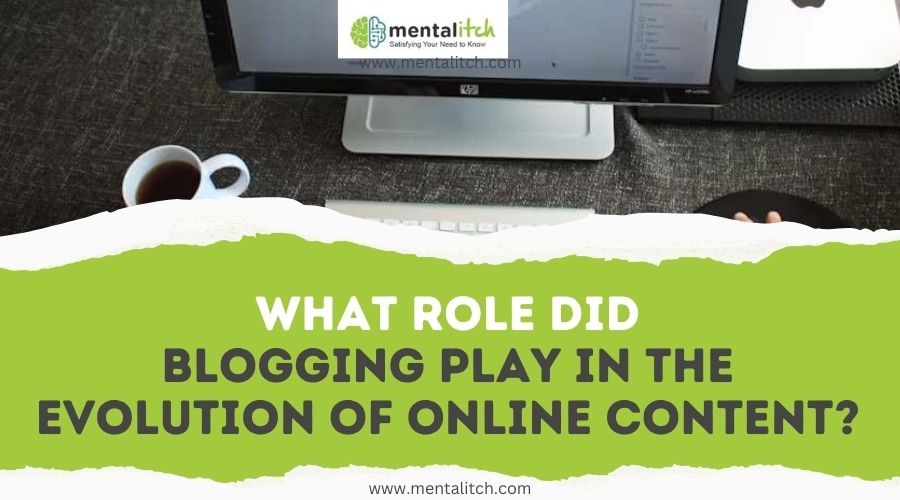In the vast digital landscape, where every click leads to a new discovery, blogging has carved out a significant niche, transforming how we consume online content. Once simple online diaries, blogs have evolved into powerful platforms that shape public opinion, influence mainstream media, and drive the digital economy. This transformation didn’t happen overnight. The journey from personal web logs to influential digital media showcases the dynamic nature of online content evolution.
As we venture further into the 21st century, the role of blogging continues to adapt and thrive amidst the ever-changing digital landscape. Not only has it empowered individuals to share their voices and stories with a global audience, but it has also become a strategic tool for businesses and influencers to engage with their audiences on a deeper level. The evolution of blogging from simple text-based posts to multimedia experiences reflects broader trends in online content consumption, including the rising demand for authenticity, interactivity, and visual storytelling.
Origins of Blogging
The story of blogging begins in the late 1990s, a time when the internet was just starting to make its mark on the world. Initially, blogs were personal online journals where individuals could share their daily experiences, thoughts, and interests with an online audience. These digital diaries offered a new form of self-expression, allowing people to document their lives and connect with others over shared experiences and hobbies.
Evolution to Professional Platforms
As the internet grew, so did the scope and ambition of blogging. What started as a personal hobby quickly transformed into a professional endeavor for many. Blogs began covering a wider range of topics, from travel and fashion to technology and politics. This shift was marked by an increase in the quality of content, with posts becoming more researched, well-written, and visually appealing. The personal touch remained, but it was now combined with professional standards, making blogs a credible source of information and insight.
Key Platforms Fueling the Blogging Boom
The explosion of blogging can largely be attributed to the emergence of user-friendly blogging platforms like Blogger and WordPress. Launched in 1999 and 2003 respectively, these platforms made it easier than ever for individuals to start their own blog. With simple interfaces and customizable templates, Blogger and WordPress opened the doors to blogging for millions of users worldwide, regardless of their technical expertise. These platforms not only supported the growth of personal blogs but also encouraged the rise of professional blogging, offering features that catered to the needs of businesses and professional content creators.
Influence on Mainstream Media and Journalism
Blogging has significantly impacted the way we consume news, contributing to the rise of a 24/7 news cycle. Unlike traditional media, which operates on set schedules, blogs offer continuous updates on events around the world. This immediacy has pushed mainstream media to adapt, leading to faster news reporting and more frequent updates. Furthermore, the rise of citizen journalism through blogs has allowed individuals to report on events in real-time, often providing personal perspectives and on-the-ground reports that large media outlets cannot.
From Blogs to Mainstream Media
Several blogs have made the leap from personal or niche platforms to prominent media outlets. Websites like The Huffington Post and TechCrunch began as blogs before growing into major news sources in their respective fields. These success stories highlight the potential of blogs not only as personal diaries but as foundations for larger media endeavors. They demonstrate how quality content and a dedicated readership can transform a simple blog into a trusted media outlet.
Credibility and Ethics in Blogging
Despite the success stories, the rise of blogging has also sparked debates on credibility and ethics. The freedom of blogging means anyone can publish content, leading to concerns over the accuracy and reliability of information. Unlike traditional journalists, bloggers may not always adhere to strict fact-checking or editorial standards, raising questions about the credibility of blog-based news. Moreover, the blending of opinion and factual reporting in blogs can blur the lines of journalistic ethics, challenging readers to distinguish between biased viewpoints and objective information.
Blogging and the Evolution of Social Media
The landscape of digital communication underwent a significant transformation with the advent of microblogging. Platforms like Twitter have bridged the gap between traditional blogging and the fast-paced world of social media. Launched in 2006, Twitter allowed users to share brief updates, thoughts, and news in real-time, encapsulating the essence of blogging in concise, engaging posts. This shift towards microblogging reflected a growing preference for quick, accessible content, catering to the increasingly mobile and time-conscious internet user.
Influence on Social Media Development
Blogging has undeniably influenced the features and development of social media networks. Many social media platforms have integrated blogging features, such as the ability to post longer articles or stories, showcasing the enduring appeal of blog-style content. Furthermore, the conversational tone and personal engagement found in blogging have become hallmarks of successful social media interactions. The emphasis on authenticity and narrative, staples of the blogging world, have shaped how brands and influencers communicate with their audiences across various platforms.
Blogs in Content Marketing
As the digital world evolved, so did the role of blogs in content marketing strategies. Blogs have become a key tool for businesses to share in-depth insights, stories, and product information, fostering a deeper connection with their audience. This shift towards content-rich marketing has been mirrored in the popularity of visual and video content on platforms like Instagram and YouTube. Here, the storytelling and informational depth characteristic of blogs blend with visual appeal, engaging audiences in a dynamic and immersive way. This convergence of blogging principles with visual media underscores the adaptability and enduring relevance of blogging in the digital content landscape.
The Current State and Future of Blogging
Today, blogs have become more than just standalone websites; they are integrated with various forms of media and online content, creating rich, multi-dimensional digital experiences. From podcasts and videos to interactive graphics, blogs now offer a wide range of content types to engage their audiences. This blending of media caters to diverse consumer preferences, allowing for deeper exploration of topics and more engaging storytelling. The seamless integration of text, audio, and video content reflects the evolving nature of digital consumption, where users expect a variety of content formats at their fingertips.
The Changing Landscape
The blogging landscape is continuously evolving, with niche blogs, professional blogging, and corporate blogs carving out significant spaces online. Niche blogs cater to specific interests, offering depth and expertise that attract dedicated audiences. Professional bloggers, on the other hand, have turned their passion into full-time careers, influencing trends and industries. Meanwhile, corporate blogs serve as a direct communication channel for businesses to share insights, news, and thought leadership, strengthening their brand and engaging with customers on a personal level. This diversity within the blogging world underscores its adaptability and the wide array of opportunities it presents for individuals and businesses alike.
Future Predictions in the Age of AI
Looking ahead, the future of blogging in the age of AI and evolving digital media is promising yet filled with challenges. Artificial intelligence is expected to play a larger role in content creation, offering tools to enhance writing, automate repetitive tasks, and personalize content for readers. However, this also raises questions about authenticity and the human touch that defines the best of blogging. Moreover, as digital media continues to evolve, bloggers will need to stay agile, embracing new technologies and platforms to reach their audiences. Despite these challenges, the core appeal of blogging—providing valuable content, fostering community, and expressing individuality—will likely ensure its continued relevance and evolution in the digital era.
Final Thoughts
Blogging has undeniably played a critical role in the evolution of online content. From its origins as a platform for personal expression, it has grown into a multifaceted medium that influences every corner of the digital world. They have become a key player in shaping news, opinions, and trends, proving their worth beyond mere personal diaries to become essential tools for communication and information dissemination. Its ability to adapt to the changing landscape of online content ensures that blogging will continue to be a vital part of our digital lives, influencing how we share, consume, and interact with information for years to come.




